英语:Unit9《Wheels》课件-lesson4Car Culture(北师大版必修3)
北师大版高中英语必修3 Unit 9《Wheels》(Car Culture)ppt课件

一二三四
Y 预习导引 U XI DAO YIN
H 核心归纳 E XIN GUI NA
5.How do you usually travel to/from school?
On foot
By bicycle
By bus
Given a lift
To
By underground
From
6.Do you own a bicycle? □ Yes □ No 7.If you could choose,how would you like to travel to school? □ On foot □ By bicycle □ Given a lift □By bus □ By underground
more 7. ·Don’t have to drive on 8. ·Don’t have to get 9.
roads in a traffic jam
Taking action somehow:talk to your 10.
about the traffic,write to
the papers,go to the city government to ask for a speed limit and a pedestrian
Lesson 4 Car Culture
-*-
一二三四
Y 预习导引 U XI DAO YIN
H 核心归纳 E XIN GUI NA
一、下面是关于上学交通方式的调查,请如实填写并与同学分享
1.The Street and Area where you live 2.Are you:□ male □ female
from doing so? □ Weather □ Distance □ Parents won’t allow you
北师大版高中英语必修3课件Unit 9 Wheels 9.4(1)

-8-
Lesson 4 Car Culture
一二三四
Y 预习导引 UXI DAOYIN
H 核心归纳 EXIN GUINA
四、阅读课文第二部分,填写下面的表格 Jenny Trowe’s Advice on How to Solve Traffic Problems
To
From
6.Do you own a bicycle? □ Yes □ No 7.If you could choose,how would you like to travel to school? □ On foot □ By bicycle □ Given a lift □By bus □ By underground
-4-
Lesson 4 Car Culture
一二三四
Y 预习导引 UXI DAOYIN
H 核心归纳 EXIN GUINA
♣It allows me to travel when I want to. □ Yes □ No □ Maybe
♣It helps me to arrive on time. □ Yes □ No □ Maybe
♣It is safer for others. □ Yes □ No □ Maybe ♣It is more enjoyable. □ Yes □ No □ Maybe ♣It helps me feel healthier. □ Yes □ No □ Maybe ♣It improves the environment. □ Yes □ No □ Maybe
【精选】_高中英语Unit9WheelsLesson4CarCulture课件北师大版必修3

-7-
课课前前篇篇 自自主主预预习习
课堂篇 合作学习
ห้องสมุดไป่ตู้
四、阅读课文第二部分,填写下面的表格
Jenny Trowe’s Advice on How to Solve Traffic Problems
What to do What you get
Walking
Taking buses Thinking twice Sharing cars
-3-
课课前前篇篇 自自主主预预习习
课堂篇 合作学习
8.Tick which description you think applies to each line.
I like/would like to walk or cycle to school because... ♣It is close to where I live. □ Yes □ No □ Maybe ♣It saves me money. □ Yes □ No □ Maybe ♣It enables me to travel with friends. □ Yes □ No □ Maybe ♣It helps to make the area more attractive. □ Yes □ No □ Maybe
Lesson 4 Car Culture
-1-
课课前前篇篇 自自主主预预习习
课堂篇 合作学习
一、下面是关于上学交通方式的调查,请如实填写并与同学分享 1.The street and area where you live: 2.Are you:□ male □ female 3.How old are you? 4.How far do you travel to school? □ Up to half a kilometer □ Between half a kilometer and one kilometer □ 1-1.9 kilometers □ 2-2.9 kilometers □ 3 kilometers and over
英语Unit9Wheelslesson4CarCulture北师大版必修3

4. What does Jenny Trowe think about car advertisements on TV?
They present an untrue picture of driving and cars.
crossroad
Prediction by the title. What’s the meaning of the title? If you are the writer, what will you talk about?
The road to Destruction
Bus /subway
Lesson 36 Car Culture
the problems caused by cars
Traffic Words
traffic jam
carbon monoxide air pollution
construction works
High way
Speed limit
pavement
Which sentence below best summarizes the writer’s attitude to cars?
1. He thinks they have more disadvantages than advantages.
√2. He knows what he should do, but uses his car because it is convenient. 3. He thinks it would be easy for us all to use our cars less.
北师大版英语必修3课件:Unit 9 Wheels4

7.________vt.适合→________adj.合适的 8.________vt.居住,占有→________n.职业 9.________n.发动机 10.________n.数字,数目
答案 1.highway 2.construction 3.amount 4.physical 5.addicted 6.admit 7.suit; suitable 8.occupy; occupation 9.engine 10.figure
·过去十年中,英国公路上行驶的汽车数量上升了 30%; ·There are now 25 million cars in this country. ·现在英国有 2,500 万辆汽车; ·Over three thousand people die every year in road accidents in Britain.
·⑧Some types of cancer are related to traffic pollution. ·有些癌症和交通污染有关系;
·Traffic is one of the major causes of global warming and climate change. ⑨The average global temperature is about 0.5 degrees centigrade higher than it was 100 years ago.
·英国每年有 3,000 多人死于车祸; ·In London,car engines produce 90% of all carbon monoxide in the atmosphere. ·伦敦大气中 99%的一氧化碳是由汽车发动机产生的; ·Twenty-five thousand deaths per year are caused by air pollution. ·每年 25,000 人死于空气污染;
说课比赛课件英语北师大版Unit 9 Lesson 4 Car culture课件(共37张)
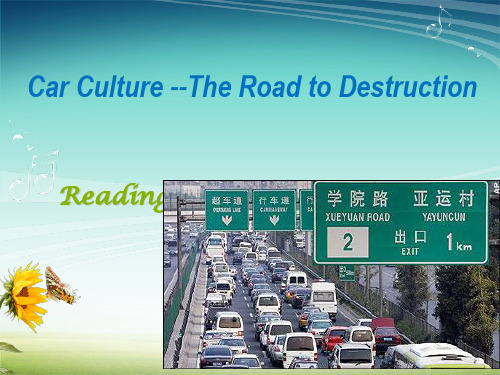
Teaching Aids
Blackboard
Pictures &Video
Handouts
Multimedia
Blackboard Design
Unit 9 Lesson 4 Car culture (The first period) Useful vocabulary: Debate Ads Disads
important information
in reading.
Key Points and Difficulty
Key Points:
1. To improve students’ reading ability & teach them to make notes effectively in reading. 2. To help students get the main idea of the text & detailed information.
1. How many cars are there in Britain? A. 25 million B. 40 million
2. How much has the number of cars on the roads gone up by in Britain in the last ten years?
Group1 Group2
G1
G2
Teaching Procedure
1
2
Warm up
Pre-reading While-reading Post-reading Homework
3 4
5
Car Culture --The Road to Destruction
Reading
高中英语北师大版高一下册《Unit9Wheels Lesson4Car Culture 》课件
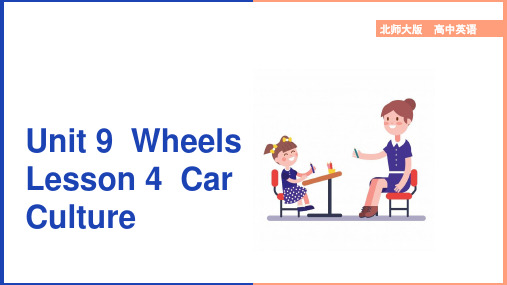
• get invited 遭到邀请
get paid 付钱
• get changed 换衣服
get broken 坏了
• get punished 遭到惩罚
get stolen 被偷走
• get lost 迷路
get married 结婚
• 单句语法填空
• 1) [词 汇 复 现]We got arrive there on schedule.
(已经弄清楚)that the building underconstruction will
• (4) We
(把……算了进去)the travel expenses but forgot the cost of meals.
• (5) Have you
(算 出)how much the trip will cost?
• 单句语法填空
• (1) [辞汇复现]It’s admitted that the number of young people (addict) to surfing the Net is going up.
• (2) [词 汇 复 现]Once you get have difficulty in getting rid of them.
数名词,作主语时,谓语 • 动词的数取决于 amount 的单复数。
• 单句语法填空
• (1) [辞汇复现]A large amount of money building more modern kindergartens so far this year.
(spend)
• (2) Large amounts of money things every year.
Unit_9_Wheels_Lesson_4_Car_culture
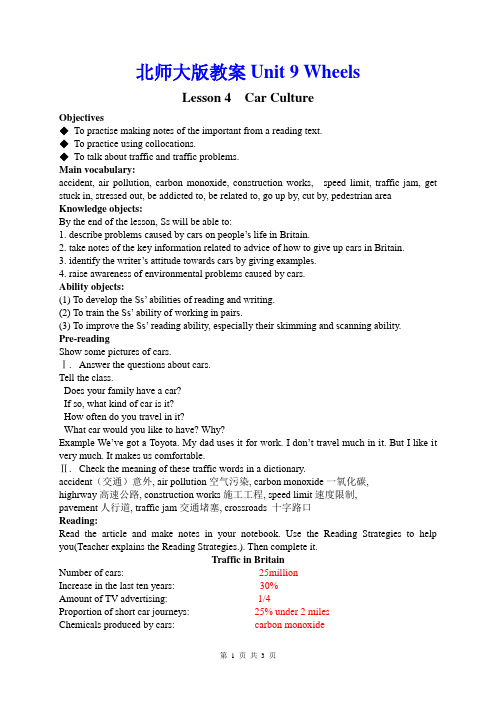
北师大版教案Unit 9 WheelsLesson 4 Car CultureObjectives◆To practise making notes of the important from a reading text.◆To practice using collocations.◆To talk about traffic and traffic problems.Main vocabulary:accident, air pollution, carbon monoxide, construction works, speed limit, traffic jam, get stuck in, stressed out, be addicted to, be related to, go up by, cut by, pedestrian area Knowledge objects:By the end of the lesson, Ss will be able to:1. describe problems caused by cars on people’s life in Britain.2. take notes of the key information related to advice of how to give up cars in Britain.3. identify the writer’s attitude towards cars by giving examples.4. raise awareness of environmental problems caused by cars.Ability objects:(1) To develop the Ss’ abilities of reading and writing.(2) To train the Ss’ ability of working in pairs.(3) To i mprove the Ss’ reading ability, especially their skimming and scanning ability.Pre-readingShow some pictures of cars.Ⅰ. Answer the questions about cars.Tell the class.Does your family have a car?If so, what kind of car is it?How often do you travel in it?What car would you like to have? Why?Example We’ve got a Toyota. My dad uses it for work. I don’t travel much in it. But I like i t very much. It makes us comfortable.Ⅱ. Check the meaning of these traffic words in a dictionary.accident(交通)意外, air pollution空气污染, carbon monoxide一氧化碳,highrway高速公路, construction works施工工程, speed limit速度限制,pavement人行道, traffic jam交通堵塞, crossroads 十字路口Reading:Read the article and make notes in your notebook. Use the Reading Strategies to help you(Teacher explains the Reading Strategies.). Then complete it.Traffic in BritainNumber of cars: 25millionIncrease in the last ten years: 30%Amount of TV advertising: 1/4Proportion of short car journeys: 25% under 2 milesChemicals produced by cars: carbon monoxideHealth effects of air pollution: 25,000 deaths p.a., types of cancer caused bytraffic pollutionNumber of road deaths: over 3,000 per yearAdvantages of buses over cars: 40 people travel in 1 bus, you can relax on a bus Advantages of sharing a car: cheaper and kinder to environment Advantages of physical exercise: saves money, keeps you fit and helps you livelonger, cuts the risk of heart diseaseWays of making streets safer: speed limit, pedestrian areaPost-readingRead the text again and answer these questions:1.What are the A10, the M11 and the M25?Roads.2.What effect does traffic have on people?Makes them angry and stressed.3. Why do people make excuses?Because they want to continue using their cars.4. What does Jenny Trowe think about car adverts on TV?They present an untrue picture of driving and cars.5. How does she think we should change our lifestyles?We should take action by writing to the papers, going to the town council, getting a protest group together.Language points:1. get stuck 陷入,卡住Use a dictionary if you get stuck.2. How often do we arrive at work or school stressed out, tired, and angry?有多少次我们极度焦虑、疲惫、恼怒地到达办公室和学校?此处的stressed out, tired, angry 是形容词做状语。
Unit 9 WheelsLesson 4 Car Culture
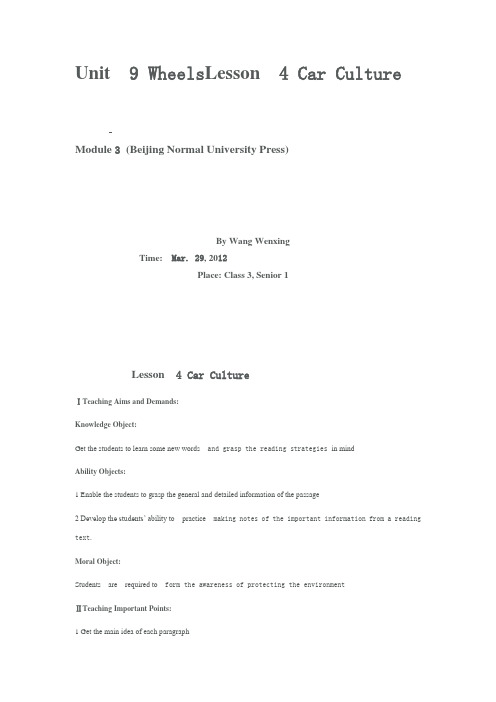
Unit9 Wheels Lesson 4 Car Culture Module 3 (Beijing Normal University Press)By Wang WenxingTime:Mar. 29, 2012Place: Class 3, Senior 1Lesson 4 Car CultureⅠTeaching Aims and Demands:Knowledge Object:Get the students to learn some new words and grasp the reading strategies in mindAbility Objects:1 Enable the students to grasp the general and detailed information of the passage2 Develop the students’ ability to practice making notes of the important information from a reading text.Moral Object:Students are required to form the awareness of protecting the environmentⅡTeaching Important Points:1 Get the main idea of each paragraph2 Get the detailed informationⅢ Teaching Difficult Point:Students are required to complete notes according to the passage.Ⅳ Teaching Methods:Task-based teaching method, interactive discussionⅤ Teaching Aids:Multi--media, the blackboardⅥ Teaching Time:One periodⅦ Teaching Procedures:Step Ⅰ Lead—in1 Show them some pictures of cars and a sk the students whether they want to have a car and why2 show them some pictures of traffic jams and accidents and ask their feelings about them StepⅡVocabularyH ave the students learn some key words before reading the textStep ⅢFast—ReadingMatch the headings with the three partsa) The advice from Jenny Troweb) The difficulty in limiting the use of carsc) Traffic in BritainStep ⅣCareful--ReadingTask 1:Completing notesStep 1: Reading Strategies1 Look at the notes and decide what kind of information you are looking for2 Read the text quickly to get the general idea.3 Then read the text again carefully and complete the notes as you read.S tep 2: Have the students read the article and make notes in the notebook, using the Reading Strategies.Task 2: Read the text more carefully and find the answers to the questions1 What are the A10, the M11 and the M25?2. What effect does traffic have on people?3. Why do people make excuses?4. What does Jenny Trowe think about car advertisements on TV?5. How does she think we should change our lifestyles?Step ⅤFurther—Reading1 How do you understand the title The Road to Destruction?A Too many cars destroy roads.B We should build enough roads to reduce traffic jams.C. Actually too many cars are destructive to our lives.D. Using cars is destructive.2 The writer’s opinion is supported by____.A. conversationsB. examplesC. figuresD. explanations3 What’s the writer's attitude towards cars?A. He thinks they have more disadvantages than advantages.B. He knows what he should do, but uses his car because it is convenient.C. He thinks it would be easy for us all to use our cars less.D. He thinks it not practical to use cars.Step ⅥDiscussionWhat can we do to protect the environment?Step VII Summary and HomeworkT: In this lesson, we’ve learnt a passage about cars and learn how to complete notes in the notebook. We’ve also get some information about protecting the environment and discuss this question with your partners. After class, please review this lesson and finish the exercise. Step VIII Blackboard DesignLesson 4 Car Culture1Key words:accident, air pollution, carbon monoxide, highway, construction works, speed limit, pavement, traffic jam, crossroads2 Reading Strategies: completing notes3 Discussion: What can we do to protect the environment?Step IX Teaching Reflection:。
Unit 9 WHEELS Lesson 4 课件 1-北师大版高中必修3精品
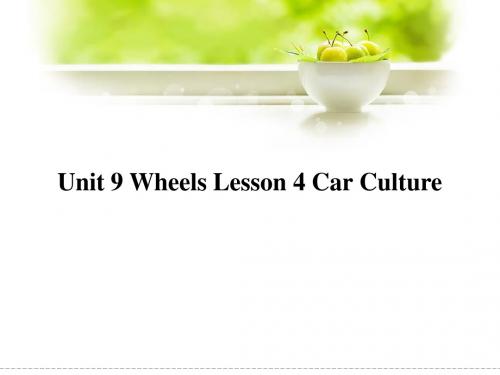
【拓展】 admit(to) sth/to doing sth承认某事/做某事 admit having done sth承认已经做了某事 admit that承认…… be admitted to...被……(学校)录取或接收 About 1,000 new boys and girls are admitted to this school every year. 这所学校每年招收大约1 000名男女新生。
3.Some types of cancer are related to________according to the passage. A.water pollution B.people's living habits C.traffic pollution
4.The author________cars. A.dislikes B.is addicted to C.hasn't got any
【感悟高考】
If you leave the club,you will not be___B_____back in.
(Байду номын сангаас009·全国Ⅱ)
A.received
B.admitted
C.turned
D.moved
解析 句意:如果你离开俱乐部,你将不会被允许返回。
admit准许进(加)入。
4.occupy vt.居住;占用(时间,空间,人的心思);忙着(做某 事) They occupy the house next door. 他们住在隔壁那所房子里。 The speeches occupied three hours.演讲占了三个小时。 A bed occupied the corner of the room. 床占了房间的一角。 Many problems occupy his attention. 许多问题占据了他的注意力。 The child occupied himself in playing computer games.
高中英语 Unit 9 lesson4《wheels》Car culture教案2 北师大版必修3

Unit 9 WheelsLesson 4 Car culture教案Teaching aims:To practise making notes of the important information form a reading text.To practise using colloctionsTo talk about traffic and traffic problemsTeaching aids: CAITeaching procedures:Step1. Warming up●Read though the questions with the class.●Give students time to think about the answers, then have individuals tell the class abouttheir family and cars.Step2. Pre-reading●Before students look the words up in dictionary, encourage them to guess the meaning by seeingif the word is similar to a word in their language, or by breaking the word down into two parts.●Explain some of the following things that can be seen in the photos.Step3. ReadingTask1 read strategies with the class.Taks2. look at the headings in the notes and discuss what information is needed to complete the notes.●Write these words on the board and ask students how they can be abbreviated●Students then work individually, reading the article and completing the notes.T ask3. exercise4●Students work in pairs, reading the text again and discussing the answers to the questions T aks4. exercise 5.●As a whole class, students discuss which of the three sentences best summarizes the writer’sattitude to cars. Encourage students to argue for their own opinion.Step4. Speaking●In groups of four or five, students discuss the answers to the questions.●The group then report back to whole class and see how similar their answers are.。
Unit 9 WHEELS Lesson 4 课件 5-北师大版高中必修3精品
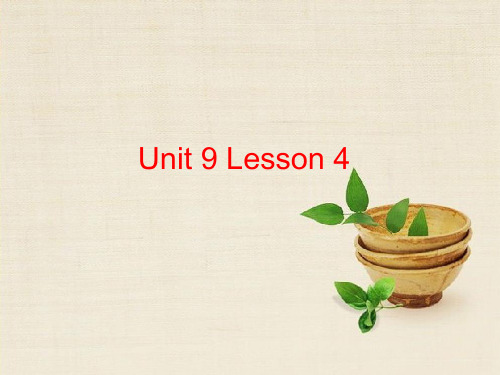
Read the first part of the article ( on Page 42 ) to learn about the traffic in Britain. Take notes while reading.
Traffic in Britain Number of cars
Rate of increase of cars Death of road accidents The writer’s complain
Traffic in Our City
Nam e
Me
Increas How e of often to cars use cars
General impression of traffic
Traffic problems
When and how does a traffic jam happen?
A: Do you have a car? B: Yes, my family has a car? A: How often do you travel in your own car? B: Every day. A: How do you use your car, for long journeys or
Use the key words in Exercise 2.
Make a mini survey in your group to collect information of traffic conditions in your city.
Interview your classmates about the general conditions of the traffic in your city. The following is for your reference.
Unit 9 lesson4《wheels》Car culture教案4(北师大版必修3)

- Continue introducing some new words naturally.
Pre-reading
3.
4.
WC
2’
Ss make guesses about some figures related to traffic inBritain. (see handout)
-- Activate Ss’ existing knowledge
-- Increase their interest in reading the passage.
- - Increase Ss’ awareness about problems caused by cars.
6.
PW
3’
Ss read the first part for the second time and underlineand check in pairs.
45 mins
Teaching objectives:
By the end of the lesson, Ss will be able to:
1.describe problems caused by cars on people’s life inBritain.
2.take notes of the key information related to advice of how to give up cars inBritain.
Lesson plan Car culture教学设计
高中英语 Unit9 lesson4《wheels》Car Culture课件2 北师大必修3

Read the second part of the article ( on page 43 ), taking notes while reading.
1.What’s the proportion(比例) of short car journeys?
2.what’s the advantages of buses over cars?
What did it happen? Traffic jam What did it cause Problems? achieve destination
What did it happen? Taffic accident What disadvantages did it take us? Transport, get stuck in ,death ,hurt
Home work
1. Go over Lesson 33,we’ll have a dictation.
2. Prepare for Lesson36,we’ll study grammars.
3. Turn to page103,look at the references about the text.
2. Do you know how many cars are on road every day?
3. What is happening on road every minute? Here we’ll read an article about traffic in Britain and talk about traffic problems.
lesson 4 Car Culture
中文名: 奥迪 英文名: audi 产 地:德国
unit9Wheels-Lesson4精品课件2(北师大必修3)

Talk in your group about the traffic problems in your town or city in the past 3 years. Remember to take notes of important information.
Name Increas Highway Traffic jams Pollution e of s built or accidents problems cars Me
Traffic jams often occur on highways wherever two lanes must merge into one. Lanes of cars cannot merge if there are no large gaps between cars. Therefore, drivers who create large gaps between cars will ease this type of traffic jam.
unit9Lesson 4精品课件2 (北师大必修3)
Lessoyou know how many cars are on road every day? What is happening on road every minute? Are cars good or bad? Here we’ll read an article about traffic in Britain and talk about traffic problems.
A: Do you have a car? B: Yes, my family has a car? A: How often do you travel in your own car? B: Every day. A: How do you use your car, for long journeys or short ones? B: Often short ones. For example, my father goes to work, my mother goes shopping, or I go to school. A: Have you ever thought what would happen on the roads if everybody travel in his own car? B: Oh, …
- 1、下载文档前请自行甄别文档内容的完整性,平台不提供额外的编辑、内容补充、找答案等附加服务。
- 2、"仅部分预览"的文档,不可在线预览部分如存在完整性等问题,可反馈申请退款(可完整预览的文档不适用该条件!)。
- 3、如文档侵犯您的权益,请联系客服反馈,我们会尽快为您处理(人工客服工作时间:9:00-18:30)。
to the environment, make a journey,
make excuses, compare to/compare with.
Which sentence below best summarizes the
writer’s attitude to cars? 1. He thinks they have more disadvantages than advantages. 2. He knows what he should do, but uses his car because it is convenient. 3. He thinks it would be easy for us all to use our cars less.
solution
Bad things about cars Plant trees along the road
Traffic jam
traffic accident
walk
Reading for the outline
Analyze the structure of the text: Part I: Traffic problems in Britain Part II:Advice given by Jenny Trowe
Lesson 36 Car Culture
the problems caused by cars
Traffic Words
traffic jam
carbon monoxide air pollution
construction works
High way
Speed limit
pavement
Homework
1. Retell the text referring to the notes. 2. Give more advice about solving the traffic problems.
√
Match the words below: 1. to make 2. around 3. to go up 4. to get stuck 5. heavy 6. a short 7. to keep 8. to have 9. public 10. to take
a) twenty minutes b) a conversation c) journey d) fit e) an excuse f) in a traffic jam g) by 20% h) transport i) the corner j) traffic
cars.
4. What does Jenny Trowe think about car advertisements on TV? They present an untrue picture of driving and cars. 5. How does she think we should change our lifestyles? Take some action somehow.(talk to/write to/ask for…)
Part III:The writer’s attitude
Reading for details:
Read the text again and answer these questions.
1. What are the A10, the M11 and M25? Roads. 2. What effect does traffic have on people? It makes them angry and stressed. 3. Why do people make excuses? Because they want to continue using the
crossroad
Prediction by the title.
What’s the meaning of the title?
If you are the writer, what will you talk about?
The road to Destruction Bus /subway
3. some useful expressions: stressed out, global warming, climate change, keep sb. fit, cut the risk of, pick up, on the other side of town, be awful, It’s much cheaper and kinder
